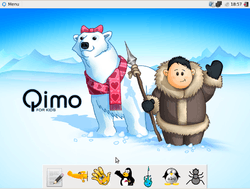Qimo 4 Kids
|
| |
 | |
| Developer(s) | QuinnCo, Michael & Michelle Hall[1] |
|---|---|
| Platform | Unix-like |
| Type | Desktop environment - for kids 3 & up |
| License | GNU General Public License |
| Website | www.qimo4kids.com |
Qimo 4 Kids (pronounced "kim-oh", as in "eskimo")[2] is a child-friendly desktop environment built entirely with free software. Qimo comes pre-installed with educational games for kids: TuxPaint, eToys, GCompris, Tuxmath, and Tuxtyping.
Large colorful icons help young users navigate easily. It is "designed for early elementary school aged children. Qimo is based on Xubuntu, using Xfce and is designed to be visually appealing for kids."[3] The fact that Qimo is based on Xubuntu, helps provide low hardware requirements: minimum of 256MB of memory to run from the CD, or 192MB to install. At least 6 GB of hard drive space and a 400 MHz or faster CPU is needed.[2]
Qimo uses LTS Lucid Lynx.[4] While it is still possible to download and run Qimo 2.0, the project was discontinued and development halted on 30 January 2016.[5]
2.0
In May 2010, Qimo 2.0 was released.[6]
- Differences between Qimo & Edubuntu
- Qimo was designed to be a standalone home computer for kids
- Edubuntu was designed for networked classroom computer use
- Qimo will run from a LiveCD
- From October 2008 to October 2009, Edubuntu required an existing Ubuntu installation. Edubuntu is available in a live medium, but only on a DVD, as its contents will not fit on a CD anymore.
- Qimo and Edubuntu discussed adding the Qimo games and artwork as an installable option within Edubuntu, but concluded that the combination would not fit on a CD.[7]
See also
References
- ↑ "Qimo 4 Kids Special thanks".
- 1 2 "Qimo 4 Kids FAQ".
- ↑ "kidsoncomputers.org Interview with developers".
- ↑ "Interview".
- ↑ Tavvaujusi, The Qimo 4 Kids team: Michael, Michelle, and Brian (30 January 2016). "Qimo 4 Kids - Software For Kids: Goodbye Friends". Qimo4kids.com. Retrieved 20 February 2016.
- ↑ "Qimo 2.0 is now available! - Desktop Operating System for Kids" Archived May 14, 2011, at the Wayback Machine.
- ↑ "What's been happening with Edubuntu". Archived from the original on 4 March 2014.